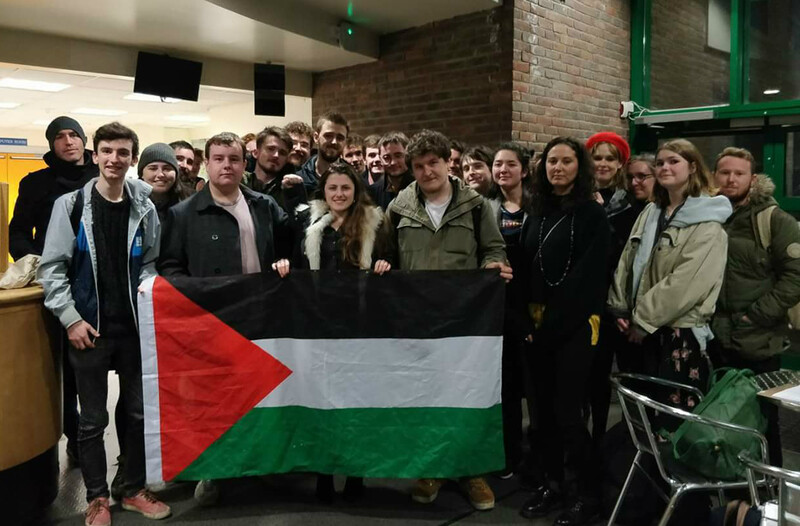Activism and BDS Beat 27 March 2018

Members of Trinity BDS Campaign worked for months to build support for their referendum. (Trinity BDS Campaign)
Students at Trinity College Dublin have voted overwhelmingly to support the boycott, divestment and sanctions (BDS) campaign for Palestinian rights.
Nearly two-thirds of students at the Irish university voted for a measure asking the student union to adopt a “long-term policy” on Palestine in support of the BDS movement – above the 60 percent threshold needed for the referendum to be binding.
The 22 March vote “was welcomed with cheers and chants,” reported The University Times.
Members of the Trinity BDS Campaign had worked for months to secure a referendum and then build support for it on campus, the Times added.
The policy requires the student union to establish a BDS implementation group, comply with the principles of BDS “in all union shops, trade, business and other union operations” and to lobby the university administration and the Irish government to formally adopt a BDS policy.
Both the incoming student union president and the president-elect of the graduate students union publicly supported the measure.
“It isn’t uncommon for students and students unions to campaign for the rights of oppressed people at home and around the globe,” Shane De Rís, the incoming student union president, told Trinity News.
De Rís added that if students can use the BDS campaign to stop corporate complicity in the oppression of Palestinians, it would be “worthwhile to do so.”
Ireland has a long history of international solidarity.
More than 30 years ago, Irish supermarket workers famously went on strike in support of colleagues disciplined for refusing to handle goods from apartheid South Africa.
Minnesota students back BDS
University of Minnesota students also passed a referendum earlier this month urging the administration to act on its socially responsible investment policy and divest from companies that profit from Israel’s human rights abuses.
The measure also demands the university pull its investments from private prisons, immigrant detention centers and corporations that violate the sovereignty of indigenous communities.
UMN Students for Justice in Palestine celebrated the victory for the grassroots campaign despite interference by Israel-aligned campus groups and defamatory remarks about the BDS campaign by the university’s president.
“It really is indicative of how powerful collective organizing is,” Malak Shahin, a member of UMN Students for Justice in Palestine, told The Electronic Intifada.
In late February, Minnesota Hillel filed a complaint with election overseers, claiming that passing a referendum in support of BDS would lead to discrimination against Jews.
The university investigated Hillel’s complaint and found no violations of campus policies, said Palestine Legal.
The civil rights group added that students documented violations of campus election rules by groups opposed to the referendum, including Minnesota Hillel and Students Supporting Israel, but the elections commission took no action.
With chapters on several campuses, Students Supporting Israel is backed by Israel lobby groups and has ties to the Israeli government.
During the election, university president Eric Kaler repeated Israel lobby talking points to undermine student activism in support of Palestinian rights.
He claimed that including Israel on the referendum “is exacerbating tension and fueling discrimination toward Jewish students.”
In a second statement after the vote, Kaler claimed that implementing BDS at the university would be “unfairly singling out” Israel and Israelis.
“The president’s statements failed to recognize the chilling impact that official condemnations like his can have on student activism,” Palestine Legal noted.
Yet, in spite of efforts “to challenge the integrity of the election, the majority of students who participated voted yes to divest,” UMN Students for Justice in Palestine stated.
Building a movement
Malak Shahin, a member of the group, explained that this referendum was motivated by a 2016 student government resolution that students felt had been stripped of its intended goal of targeting corporations that profit from human rights violations.
Since then campus activists worked to broaden their coalition “so we could include more issues [in the campus referendum] – and because it’s more representative of the student body,” she said.
In April 2016, the UMN Divest campaign introduced a student government resolution, cosponsored by 36 groups, calling for divestment from “four particular companies profiting from human rights violations in the occupied Palestinian territories, the US/Mexico border and in prison detention centers across the world.”
But it was amended to remove any reference to the specific companies, “leaving only the ask for transparency and the demand to divest from generally any company that profits off violations of human rights,” UMN Divest stated at the time.
According to campus newspaper The Minnesota Daily, the amendment was proposed by Students Supporting Israel.
President Kaler also denounced BDS before the 2016 vote.
Shahin said that over the last two years, student activists focused on building “power and solidarity” rather than just pursuing a campaign victory.
The referendum was successful, according to Shahin, because students engaged others about the connections between violations of Palestinian rights, indigenous sovereignty and the private prison industry.
Shahin said that whether or not university administrators uphold student demands to divest, such engagement is critical to “lay the foundation for a movement to grow out of this.”






Comments
Its great to see Irish
Permalink Mozibur Ullah replied on
Its great to see Irish students stand up for justice for the Palestinians and stand behind the BDS movement.
students lead the way
Permalink tom hall replied on
Herewith, congratulations and expressions of solidarity for the students who voted in favor of BDS and Palestinian rights at Trinity and UMN. In particular, standing up on campus in this way presents many difficulties for students in the U.S. They face strident, well-funded campaigns of vilification and even blacklisting, yet they persist in defending the cause of justice. They're to be admired for the risks taken and the principles to which they adhere.